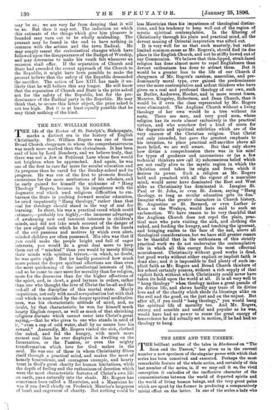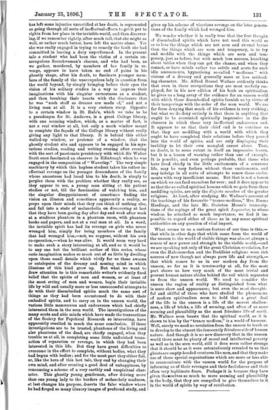THE SEEN AND THE UNSEEN.
THE brilliant author of the tales in Blackwood on "The Seen and the Unseen," has given us in the current number a new specimen of the singular power with whioh that series has been conceived and executed. Perhaps the most remarkable feature of the whole series, and certainly of this last number of the series, is, if we may call it so, the vivid conception it embodies of the ineffective character of the communications between the world of departed spirits and the world of living human beings, and the very great pains which are spent by the former in producing a comparatively trivial effect on the latter. In one of the series a lady who has left some injustice nnrectified at her death, is represented as going through all sorts of ineffectual efforts to get it put to rights from her place in the invisible world, and then discover- ing, if we remember rightly, after much toil, that she might as well, or rather much better, have left the matter alone. Yet she was really engaged in trying to remedy the fault she had committed in leaving a duty unperformed. In the present tale a student who had been the victim of a certain un- scrupulous Scotchwonaan'a charms, and who had been, as we gather, murdered, by members of her family in re- venge, appears to have taken no end of pains in his ghostly shape, after his death, to fascinate younger mem- bers of the family of the unscrupulous lady in question from the world beyond, by simply bringing before their eyes the vision of his solitary studies in a way to impress their imaginations with his singular earnestness as a student, and then breaking their hearts with -the disclosure that he was "such stuff as dreams are made of," and not a living man at all. It is a very curious story. Opposite to a certain window in St. Rule's, which we take to be a pseudonym for St. Andrews, is a, great College library, with one seeming window, which, as a matter of fact, is not a real window at all, but only a mock window meant to complete the facade of the College library without really giving any light to that library. It is behind this either walled-up window, or pretence of a window, that the ghostly student sits and appears to be engaged in his mys- terious studies, reading and writing evening after evening with the sort of passionate persistency with which Sir Walter Scott once fascinated an observer in Edinburgh when be was engaged in the composition of " Waverley." The very simple machinery by which this hapless student takes his rather in- effectual revenge on the younger descendants of the family whose ancestress had lured him to his death, is simply to perplex them with the problem whether they really see, as they appear to see, a young man sitting at his patient studies or not, till the fascination of watching him, and the singular disappointment of sometimes finding the vision an illusion and sometimes apparently a reality, so preys upon their minds that they can think of nothing else, and fall into a state of melancholia on discovering at last that they have been gazing day after day and week after week at a studious phantom in a phantom room, with phantom books and papers, and not at a real man at all. In a word, the invisible spirit has had its revenge on girls who never wronged him, simply for being members of the family that had wronged him,—not, we suppose, without his own co-operation,—when he was alive. It would seem very hard to make such a story interesting at all, and so it would be to any one but the brilliant author of this series, whose eerie imagination makes so much out of so little by dwelling upon those small details which vivify for us those swoons or catalepsies of the dreamy and musing mind in which illusions of this kind grow up. But what we want to draw attention to is this remarkable writer's evidently fixed belief that the spirits of men and women, or at least of the most erring of men and women, begin their invisible life by wild and usually more or less unsuccessful attempts to do with their disembodied spirits much the same sort of things as they had been accustomed to do with their embodied spirits, and to carry on in the unseen world, the various little manceuvres and endeavours which had chiefly interested them in the seen world. The investigations of the many acute and able minds which have made the transactions of the Society for Psychical Research so interesting, have apparently resulted in much the same conclusion. If these investigations are to be trusted, phantoms of the living and also phantoms of the dead, are chiefly engaged, when they trouble us at all, in completing some little unfinished trans- action of reparation or revenge, in which they had been interested in this life. But they have great difficulties to overcome in the effort to complete, without bodies, what they had begun with bodies ; and for the most part they either fail, or, lie the hero of this last tale, they end by changing their own mind, and after creating a good deal of unhappiness, by renouncing a scheme of a very earthly and nrumiritual char- acter. This ghostly young gentleman, after driving more than one young lady to the borders of melancholy madness, at last changes his purpose, deserts the false window where he had forged so many illusory images of profound study, and gives up his scheme of vicarious revenge on the later genera- tions of the family which had wronged him.
We wonder whether it is really true that the first thought of disembodied spirits which have not used this world so as to love the things which are not seen and eternal better than the things which are seen and temporary, is to try and meddle with the things which are seen and tem- porary, just as before, but with much less success, knocking about tables when they can get the chance, and when they cannot, or have minds rather too subtle and acute for such idle amusements, hypnotising so-called " mediums " with visions of a dreamy and generally more or less mislead- ing character. Mr. Alfred Russel Wallace evidently thinks that even in these occupations they are moat usefully em- ployed, for in his new edition of his book on spiritualism he gives us a long array of the evidence for an unseen world with which those disembodied spirits furnish us by virtue of their tamperings with the order of the seen world. We are far from denying that much of his evidence is very striking; bat what we do deny entirely is that there is anything that ought to be accounted spiritually impressive in the dis- closures in which those very ineffectual endeavours end. It appears to us that their chief end is to convince us that they are meddling with a world with which they ought to have completed their relations before they passed into the world of spirits, and are only displaying their inability to let their own mangled career alone. That, no doubt, is to some extent in itself an impressive lesson, but it is a lesson of warning rather than one of example. It is possible, and even perhaps probable, that those who have lived chiefly in the little excitements of a sensuous life, may be very forlorn without these excitements, and may indulge in all sorts of attempts to renew these excite- ments with very insufficient means. But that is not a lesson on which we can feed ourselves for ever:, and it does appear to us that the so-called spiritual lessons which we gain from these meddling spirits, are only the disjecta membra of the greater religions. At least, after studying Mr. Wallace's account of the teachings of his favourite "trance-medium," Mrs. Emma Hardinge, and the late Mr. Stainton Moses's transcrip- tions of the sayings of the great spirit Imperator, to whose wisdom he attached so much importance, we find it im- possible to regard either of these as in any sense spiritual authorities on any question of vital import.
What seems to us a curious feature of our time is this,— that while in other days that which came from the world of the unseen to the world of visible things was almost always a source of new power and strength to the visible world,—and we are speaking not only of the great Christian revelation, for even the Mahommedan and the Buddhist religions were rich sources of new though not always pure life and strength,— that which comes to us in our modern day from the unseen, so far as it is trustworthy at all, for the most part shows us how very much of the most trivial and poorest human nature abides behind the veil which separates us from the unseen world. We used to consider the unseen the region of reality as distinguished from what is mere show and appearance ; but even the most thought- ful and skilful of those who have studied the phenomena of modern spiritualism seem to hold that a great deal of the life in the unseen is a life of the merest shallow- ness, a life of tricks, a life of seeming, and often of as mere seeming and plausibility as the most frivolous life of earth. Mr. Wallace even boasts that the spiritual world, as it is shown to him by the " trance medium," is a world of humour. Well, surely we need no revelation from the unseen to teach us to develop to the utmost the innocently frivolous side of human nature. And though it is no new discovery that in the unseen world there must be plenty of moral and intellectual poverty as well as in the seen world, still it does seem rather strange that it should be as it were ostentatiously revealed to us that ghosts are empty-headed creatures like men, and that they make use of those special organisations which are more or less able to communicate with the unseen world for the purpose of informing us of their revenges and their foolishness and their often very legitimate fears. Perhaps it is because they have given themselves so much to mere seeming and plausibility in the body, that they are compelled to give themselves to it in the world of spirits by way of retribution.



















































 Previous page
Previous page